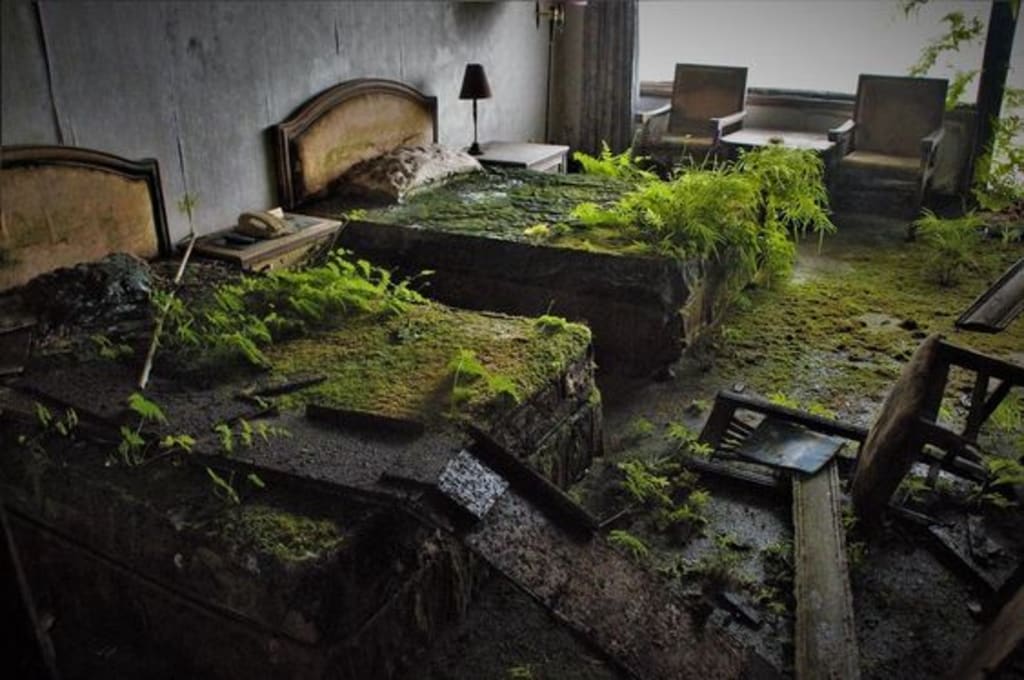What Is Hers
It is not ours to stake our claim

It had become hard to hold her hand, the colder her skin became. My mother, the very woman that breathed life into me, was coming face to face with death. The hard, wooden floor creaked beneath her weight as she writhed and flailed, her body hopeless in it’s final efforts to free itself from the pain. Her movements were jerky and unpredictable. Her legs twisted and her back arched. Saliva dripped from the corners of her mouth each time her lips parted to give way to a harrowing gurgle. My attempts at comfort were futile, but still, I brushed my free hand across her forehead, gently shushing, not unlike one would hush a crying baby.
“It’s okay,” I whispered, “It’s going to be okay.”
I knew it was only a matter of time before I was in her place, though much more helpless and alone. The virus that ravaged my mother’s body would, sooner or later, take over mine, too. But, I had grown fond of the idea of the end. I wasn’t sure what came after death, but whatever it was, I was certain it had to be better than this.
The few memories I had of life before this were fading, growing dim and grey the longer I stayed tucked away. Apart from the faint, cloudy light that glistened through the single pane of frosted glass fixed to the attic wall, I had not seen the sun in months. Bustling cities and all that came with it--restaurants, movie theatres, grocery stores-- they were nothing more than stories; fairy tales in comparison to the way things had become. My father, before he died, would delight my brother and I with anecdotes of airports and museums; things we never got to experience before the virus seized the globe in cold and unforgiving hands.
It happened overnight--or at least, it felt like it did. Rumors and fears of a deadly virus spread like wildfire as streets became mass graves for those that dropped without warning. It was not a quick demise. Cries of thousands, tormented with disease, filled the air until one by one, each dying person’s lungs gave way and the grasp of death took over. Governments collapsed as people in power succumbed to the throes of pestilence.
As the plague spread, my father heeded the warnings put out by those that had seen the virus firsthand; Stay inside. Lock the doors. Board up the windows. Do not trust anyone. I still remember, though vaguely now, the sounds of strangers pounding on our door, seeking means of survival or shelter. Family turned on family, friend turned on friend. The cries of the sick, dying, and those in mourning, rang out across our town, not to be kept out by the wooden planks nailed across the windows by my father. He moved us to the attic not long after the outbreak began.
My father and brother died together. My brother, a child of only six years old, got sick first, letting out a long, terrible howl just days after our relocation to what we believed was a safer space. I do not believe it would have made a difference, but there were days after their deaths that I wished my father hadn’t held my brother so close as the virus wreaked havoc on his little body. I thought, unrealistically, that perhaps he would have made it a little longer if he had just let him die alone. It was a terrible thought, but the grief was heavy and twisted my mind into dark, pitiless places.
My mother practically welcomed the reaper, distraught over the loss of her husband and son. I was not enough to soothe her aching heart, and I did not try. There was no silver lining, no light at the end of any metaphorical tunnel. There was, in some sort of sick way, a feeling of relief when she finally got sick. Her suffering was coming to an end. I longed for peace for her, in the same way I had longed for peace for my father and brother, too.
As I listened to her bellow and gag, I glanced over at my father’s body. His mouth hung open and his eyes were wide in a permanent expression of fear and torment. My brother looked much more peaceful, as if he was only resting against my father’s chest. There was not much left of them now. We could not go outside to bury them, so they laid, still and untouched for weeks, decomposing in the stuffy heat of the tiny attic. My mother and I had grown used to the smell as it mixed with the dust and the scent of our own unavoidable filth, but the sight, a cruel reminder of what was to come, never failed to make me queasy. I pondered for a moment the likelihood of someone ever finding our bodies, if by some miracle anyone survived at all. I wondered if the sight would move a stranger enough to gather up our bones and return us to the Earth.
My thoughts were quickly broken by the piercing wails of my dying mother.
“The trees, the trees, the trees”, she cried. Her legs stiffened and her eyes rolled back as she thrashed. She let go of my hand and reached out in front of her, sobbing and grasping at the air. As her cries grew steadily into screams I knew it was the end, as I had with my father and my brother before her. In their final moments, nonsense about forests and rivers and plains rolled from their tongues in cryptic heaps. My brother pleaded with oceans, begging them for forgiveness just as his body gave out. My father wept over mountains and hills. They were tortured by nature. Psychosis, I was sure, brought on by the fevers and pains of the unrelenting virus.
Reaching up towards her throat, my mother quickly tugged at a small silver heart-shaped locket that hung around her neck--a gift from my father many years before. In one swift pull, she snapped the chain and hurled the piece of jewelry across the attic and into the wall, shattering it against the wood. She took one more large, shaky breath before growing still, her arms flopping to either side. Her chest no longer rose and fell, her mouth dropped open and her head rolled toward me. I brushed my hand across her face, closing her eyes to keep them from staring through me.
The weight of loneliness wasted no time inching its way through my bones. I knew I would be the next--the last--to die, and unlike my family before me, I would have to die alone.
There was a longing, a hunger deep inside of me, to see the sky again before I died.
So, I decided, I would not deny myself that simple joy.
I had forgotten what the rest of my house looked like, and, despite the urge I felt to explore my old bedroom, the family room, and the kitchen, I wasted no time. Cracking open the front door, the light stung at my eyes, but the sun enveloped me in a warmth I had not felt in so long. I stepped onto the stone stoop, shielding my squinted eyes from view until they had adjusted to light beyond what little had shone into the attic.
The remnants of the neighborhood I once knew remained, but now much different than before.
Long, thick vines and ivy with flowers grew up the sides of houses, through windows and opened doorways, and engulfed abandoned cars into dense, leafy casings. Mounds of green stuck out amongst the grass and pavement, no doubt the bodies of those that tried and failed to escape their doom. Flocks of birds flew overhead and large deer with long horns on proud display munched on cloves across the road. Butterflies, dragonflies, and bumblebees fluttered and bounced from plant to plant.
I watched in silent awe at the world before me, as a feeling of clarity brushed over me with the light, comforting breeze.
In a field of green, the answer lay.
The Earth will reclaim what is Hers.
About the Creator
Madelyn Boughter
Writing to fill the void.






Comments
There are no comments for this story
Be the first to respond and start the conversation.